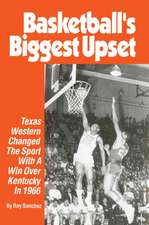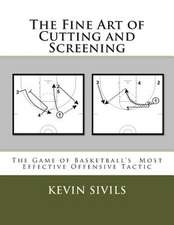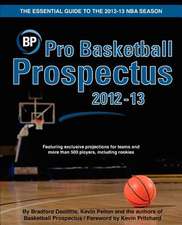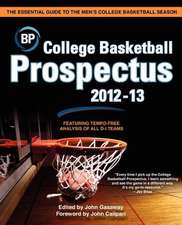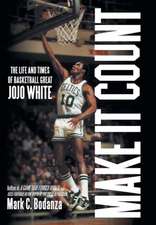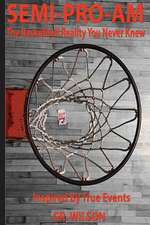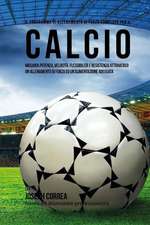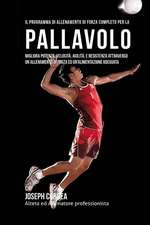Playing with the Big Boys: Basketball, American Imperialism, and Subaltern Discourse in the Philippines
Autor Lou Antolihaoen Limba Engleză Hardback – 13 iul 2023
Basketball has a lock on the Filipino soul. From big arenas in Manila to makeshift hoops in small villages, basketball is played by Filipinos of all walks of life and is used to mark everything from summer breaks for students to religious festivals and many other occasions. Playing with the Big Boys traces the social history of basketball in the Philippines from an educational and “civilizing” tool in the early twentieth century to its status as national pastime since the country gained independence after World War II.
While the phrase “playing with the big boys” describes the challenge of playing basketball against outsized opponents, it also describes the struggle for recognition that the Philippines, as a subaltern society, has had to contend with in its larger transnational relationships as a former U.S. colony.
Lou Antolihao goes beyond the empire-colony dichotomy by covering Filipino basketball in a wider range of comparisons, such as that involving the growing influence of Asia in its region, particularly China and Japan. In this context, Antolihao shows how Philippines basketball has moved from a vehicle for Americanization to a force for globalization in which the United States, while still a key player, is challenged by other basketball-playing countries.
Lou Antolihao goes beyond the empire-colony dichotomy by covering Filipino basketball in a wider range of comparisons, such as that involving the growing influence of Asia in its region, particularly China and Japan. In this context, Antolihao shows how Philippines basketball has moved from a vehicle for Americanization to a force for globalization in which the United States, while still a key player, is challenged by other basketball-playing countries.
Preț: 390.14 lei
Nou
Puncte Express: 585
Preț estimativ în valută:
74.66€ • 81.07$ • 62.72£
74.66€ • 81.07$ • 62.72£
Carte disponibilă
Livrare economică 01-15 aprilie
Preluare comenzi: 021 569.72.76
Specificații
ISBN-13: 9780803255463
ISBN-10: 0803255462
Pagini: 264
Ilustrații: 8 photographs, 6 tables, index
Dimensiuni: 140 x 216 x 26 mm
Greutate: 0.46 kg
Editura: Nebraska
Colecția University of Nebraska Press
Locul publicării:United States
ISBN-10: 0803255462
Pagini: 264
Ilustrații: 8 photographs, 6 tables, index
Dimensiuni: 140 x 216 x 26 mm
Greutate: 0.46 kg
Editura: Nebraska
Colecția University of Nebraska Press
Locul publicării:United States
Notă biografică
Lou Antolihao is a sociologist who specializes in leisure studies and comparative-historical analysis. He has held research and teaching appointments in the Philippines, Singapore, and Japan, most recently as the JSPS Postdoctoral Fellow at the Center for Southeast Asian Studies, Kyoto University.
Cuprins
List of Illustrations
List of Tables
Acknowledgments
List of Abbreviations
Introduction
1. Spheroid of Influence: Sports, Colonization, Modernity
2. From Baseball Colony to Basketball Republic: Postcolonial Transition and National Sporting Culture
3. The Hollywoodization of Hoops: Basketball, Mass Media, Popular Culture
4. Rooting for the Underdog: Sports, Spectatorship, Subalternity
5. Basketball without Borders: Globalization and National Sports in Postcolonial Context
Conclusion
Notes
Bibliography
Index
List of Tables
Acknowledgments
List of Abbreviations
Introduction
1. Spheroid of Influence: Sports, Colonization, Modernity
2. From Baseball Colony to Basketball Republic: Postcolonial Transition and National Sporting Culture
3. The Hollywoodization of Hoops: Basketball, Mass Media, Popular Culture
4. Rooting for the Underdog: Sports, Spectatorship, Subalternity
5. Basketball without Borders: Globalization and National Sports in Postcolonial Context
Conclusion
Notes
Bibliography
Index
Recenzii
"Antolihao provides a well-crafted narrative of the historical and social discourse of basketball in the Philippines."—Chad Carlson, Journal of Sport History
"Antolihao has written a very interesting study that nobody working on Philippine basketball and baseball can ignore."—Stefan Hübner, Journal of Asian American Studies
“Attentive to the ways in which so many aspects of political and national discourse intersect with the game of basketball. Any historians working on Philippine history or the history of sport and colonialism would be well served by reading this work.”—Andrew D. Morris, professor of history at California Polytechnic State University, San Luis Obispo

